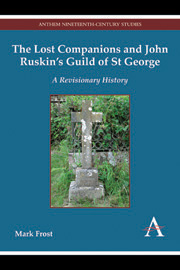Book contents
- Frontmatter
- Dedication
- Contents
- List of Illustrations
- Preface
- Frequently Cited Sources
- Introduction
- Chapter One Roots
- Chapter Two Glimpsing Eden: 1867–70
- Chapter Three ‘At Least a Beginning’: 1871–75
- Chapter Four Opportunities: 1875–77
- Chapter Five Dreams and Nightmares: 1878–81
- Chapter Six The Long Decline and the Great Dispute: 1882–1900
- Afterword
- Appendix Companions of the Guild of St George: Early Lists
- Notes
- Bibliography
- Index
- Frontmatter
- Dedication
- Contents
- List of Illustrations
- Preface
- Frequently Cited Sources
- Introduction
- Chapter One Roots
- Chapter Two Glimpsing Eden: 1867–70
- Chapter Three ‘At Least a Beginning’: 1871–75
- Chapter Four Opportunities: 1875–77
- Chapter Five Dreams and Nightmares: 1878–81
- Chapter Six The Long Decline and the Great Dispute: 1882–1900
- Afterword
- Appendix Companions of the Guild of St George: Early Lists
- Notes
- Bibliography
- Index
Summary
The story of the Guild of St George has been told more than once, and its outline is well known.
(Wheeler 1999, 222)In past years I would have readily assented to this seemingly uncontroversial assessment of Guild scholarship. I am now astonished at how very wide of the mark it is. The full story of the Guild has, it transpires, never been told, and its well-known outline is but a shadow of a far larger and more compelling tale. Considerable portions of Guild history have been invisible to scholars, many of its most important episodes and figures have become obscure, and some of its most compelling voices have never been heard. What follows is both a reinstatement of much that has been lost, and a critical enquiry into the reasons for that loss. The present work began with a chance discovery of one of those lost voices, led to a quest that uncovered several more, and ended by concluding that a wholesale transformation of our understanding of that seemingly familiar tale of John Ruskin's utopian venture is long overdue. In pursuing this, it became necessary to address deeply problematical aspects of that venture, to critique the fundamentals of Ruskin's politics, and to unleash a polyphony of competing voices that have been occluded and suppressed. It might be thought remarkable that the present work is in a position to reveal so much new information after more than a century of Guild scholarship. It is far more remarkable that this information has for so long remained obscure. Until now, the story of the Guild has largely been refracted through the viewpoints of Ruskin and his closest allies.
- Type
- Chapter
- Information
- Publisher: Anthem PressPrint publication year: 2014



